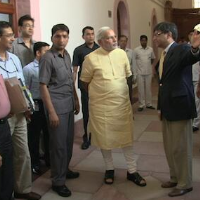Govt’s Hindi Directive Sparks North-South Divide
 Prime Minister Narendra Modi meets bureacrats in New Delhi
Prime Minister Narendra Modi meets bureacrats in New Delhi
The Modi government has sparked off a linguistic confrontation with its directive to use Hindi in official correspondence instead of English.
English and Hindi are both the official languages of the Indian government, but with 22 languages recognised by the Constitution and 780 languages in total the country is highly diverse linguistically. With language linked with notions of identity, the new emphasis on Hindi is being seen by southern politicians as the “imposition of Hindi”.
Prime Minister Narendra Modi can speak English, but is more comfortable in Hindi. As a nationalist, he has deliberately chosen to speak in Hindi in official meetings and with foreign dignitaries. Modi has also declared that all official documents of the central government must be written in Hindi.
According to the Hindustan Times, civil servants in New Delhi have reportedly been brushing up their Hindi writing skills after the BJP won the general election in May.
The newspaper found that while many bureaucrats can speak the language, few know the formal phrases needed for official communication. The language shift is being seen as an “outsider's attempt to etch his own imprint on the political culture of the national capital.”
But with more than half of India's 1.2 billion people speaking in another language, the push for Hindi risks widening divisions, especially in the southern and eastern states, where local languages or English are preferred, according to Reuters.
The latest controversy was sparked off by a recent circular issued by the Director (Official Language) Avadesh Kumar Mishra: “All officers and employees who operate official accounts on Twitter, Facebook, blogs, Google, YouTube should use Hindi and English languages. Prominence should be given to Hindi.”
This sparked off angry reactions from regional parties from south India, many of whom were at the forefront of the anti-Hindi agitation in the 1960s.
DMK chief M Karunanidhi said the Prime Minister should focus on economic growth and social development instead.
“Giving priority to Hindi will be construed as a first step towards attempt at creating differences among non-Hindi speaking people and making them second class citizens,” the 90-year old leader said in a statement on Thursday.
His arch-rival in Tamil Nadu, Chief Minister Jayalalithaa, claimed the “highly sensitive issue” had caused “disquiet” to Tamils “who are very proud of and passionate about their linguistic heritage”.
Congress leader P Chidambaram also joined in, warning that “there will be a backlash in non-Hindi speaking states specially Tamil Nadu.”
Just how an emotive issue this is was borne out when the BJP’s allies in Tamil Nadu, PMK and MDMK, also opposed the move.
Home Minister Rajnath Singh clarified in a tweet: "The Home Ministry is of the view that all Indian languages are important. The Ministry is committed to promote all languages of the country."
But the government was eventually forced to back down on Friday. It clarified that the directive was meant for Hindi-speaking states only and would not be imposed on other states. Bureaucrats in non-Hindi-speaking states can breathe easy.
This controversy shows the limits of centralised functioning as favoured by Modi’s administration. India’s federal structure and its social diversity make such directives difficult to enforce on a large scale, especially when it comes to regional identities and language.
- Karan Singh
- Top Stories
- Controversies
- Where is the Money Going?
- India and the World
- Appointments and Resignations
- Unusual News
- Latest News
- India College Chain’s Expansion into U.S. Draws Opposition from Massachusetts Officials over Quality of Education
- Milk Shortages in India Tied to Release of New Movies Featuring Nation’s Favorite Stars
- Confusion Swirls around Kashmir Newspaper Ban in Wake of Violent Street Protests
- Polio-Free for 5 Years, India Launches Vaccine Drive after Polio Strain Discovery
- New Aviation Policy Could Increase Service, Lower Ticket Prices






Comments